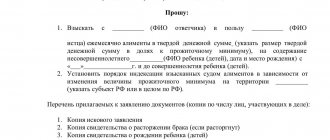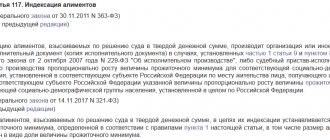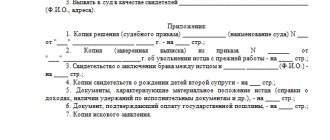When is it possible to file a claim for alimony for a parent?
Parents can demand financial support only from able-bodied children who have reached the age of majority, but have not reached retirement age. According to the law, it is prohibited to force disabled children of groups 1 and 2 to pay alimony to their parents. Parents cannot demand financial support in the following cases:
- as a result of deprivation of parental rights;
- if there is evidence of refusal to pay child support;
- Parental responsibilities were not fully fulfilled.
It follows from this that only parents who have fulfilled their parental responsibilities well can count on the help of their children.
Financial support for parents of retirement age from children is paid either voluntarily or through the court. In the first option, the amount of assistance is determined by agreement; in the second, the parents file a claim.
Parents can only agree on voluntary support in writing. A written agreement can be concluded with a notary or executed independently by having the agreement certified by a notary. The agreement, concluded with the help of a notary, specifies the monthly amount of support payments to parents; Full names of those participating in the agreement and other information as necessary. With this document it will be possible to contact the FSSP in case of failure of children to fulfill their duties.
Find out more about the nuances of collecting child support from a son by a mother or father.
Applying to court to collect child support for a parent in 2021
If the parents cannot agree on voluntary support, then they can go to court to force alimony to be collected.
Appeal to the court is carried out at the place of residence of the children. If it is unknown, the plaintiff can send a claim to their last known place of residence or file a claim at their place of residence.
Sample statement of claim for collection of alimony for parents
The claim is drawn up taking into account the requirements of Art. 131 Code of Civil Procedure of the Russian Federation. But its norms do not contain conditions for this category of cases, so you can be guided by the list below, formulated taking into account current practice:
- The header of the application indicates the name of the judicial authority and its address.
- After the court address, you must indicate the full name of the plaintiff, his address of residence and registration, and then the same information for the defendant.
- The introductory part of the claim provides general information about family relationships, the date of birth of the defendant, and brief information about him. When did you live with your parent, how did you help, etc.
- Afterwards, it is necessary to substantiate all evidence of the children’s failure to provide assistance to the parent, and provide links to evidence.
- Then the amount of alimony is justified. What is the parent's income? What is there not enough money for and so on.
- A claim is made to the court indicating the exact amount of the penalty.
- A signature and date are added, and the attachments are listed.
You can file a claim without a lawyer, but collecting money for the maintenance of a parent is one of the most difficult categories. When collecting alimony for non-children, a fractional amount is usually used; for parents, alimony is recovered only in a fixed amount. It is hardly possible for an ordinary pensioner to justify it and prove need without the help of a lawyer.
Our specialists can provide a free consultation and consider your question. Lawyers will answer whether you need legal assistance and whether there is a chance of collecting child support in your case.
The sample below is provided for your information. You can also use it to file a claim yourself.
Documentation
Along with the claim for maintenance of the parent, you must provide:
- A copy of the claim for the defendant;
- A document that confirms the parents' incapacity for work. This may be a disability certificate or a pension certificate;
- Birth certificates of all children or certificates from the civil registry office, if such a document is not available;
- Documents that can confirm the parents’ income, if any. Certificate from the pension, information about the amount of disability benefits, etc.
- Documentation that will confirm the need for treatment, namely certificates, prescriptions from the attending doctor, receipts from the pharmacy, agreement with the nurse and others;
- A photocopy of your passport and work record book.
The list of everything presented is reflected in the statement of claim after the request for alimony.
The list above is approximate. The exact list of documents is established when filing a claim and may vary depending on your situation.
Evidence for the claim
The court will take into account all the income of children and parents (indirectly - unofficial too), and will also take into account the expenses of both parties. The court may reject a request for maintenance if the parent can provide for himself. For example, he has money in his account, various benefits or additional income.
The claim may be rejected if the defendant has dependent small children, a wife (husband) or another relative who does not leave him free income to help his parents. Also, alimony may be awarded in a minimum amount under such circumstances.
But in such situations, where the parent’s pension is not more than the subsistence level or he needs treatment that is very expensive, he needs expensive medications, etc., the court will most likely satisfy the claim.
The RF IC provides for the possibility of refusing to award alimony for inappropriate behavior, but this does not apply to minor children. Child support will be denied to parents who have been deprived of parental rights to a child or who at one time had arrears in child support.
Example: Plaintiff A. filed a claim with the court to recover funds for his maintenance from his daughter K., indicating that his pension is 11,700 rubles, of which 7,000 rubles are spent on utilities, and the rest of the funds are spent on medicines.
The daughter works in her husband’s company and has all the necessary means for a normal life and to help her mother.
The court, having verified the plaintiff’s arguments and taken into account the defendant’s objections, established the following facts:
- The official income of the defendant is 13,000 rubles;
- She is dependent on two young children, one of whom is from her first marriage. For a child from his first marriage, his father does not pay alimony; K.’s husband practically does not participate in the maintenance of the child;
- The plaintiff has over 2.5 million rubles in her accounts with Sberbank PJSC, interest payments from the placement of which are transferred to her monthly to her bank card and amount to an average of about 14,000 rubles.
The court found that the plaintiff's income was sufficient to cover her needs. At the same time, the plaintiff’s income is not a basis for complete exemption from alimony. The court ordered alimony from K. to support her mother in the amount of 1,380 rubles, i.e. in the form of 15% of the cost of living for pensioners.
State duty
There is no need to pay state duty for alimony, since persons demanding the collection of alimony have the right to go to court free of charge.
If the court finds that the parents really need support, and the children have such an opportunity, the court will make a positive decision in the case and collect a state fee of 150 rubles from the defendant.
The size of the state duty is established in Art. 333.19 of the Tax Code of the Russian Federation, and benefits for its payment are in Art. 333.36 Tax Code of the Russian Federation.
In what cases is alimony returned?
Repayment of previously paid alimony occurs in exceptional cases, even after successful challenge of paternity. Demanding alimony in favor of children is a priority enforcement procedure, and very serious grounds are needed to cancel it (and even more so to return the funds). The court always interprets any controversial issue in favor of the minor.
Article No. 116 of the Family Code (FC RF) states that the return of alimony is unacceptable. But there are exceptions. Return of the transferred money is possible if it is proven in court that:
- the recipient submitted false documents or information to the court;
- the payer entered into the agreement under the influence of threats, violent acts, or deliberate deception;
- the interested party forged documents (writ of execution, court decision or agreement), and payments were made on their basis.
If these actions were committed by a representative of a minor child or a person declared incompetent, then the return of alimony is ensured by who is guilty, and not by the one who received the payments. It is unacceptable for money to be collected from a child’s personal account or through the sale of his personal property.
This law says nothing about challenging paternity and its connection with the return of alimony. But it can be assumed that deception and forgery of documents may be associated with the misleading of the man and the court regarding paternity by interested parties. The court may take such arguments into account as an argument for the return of alimony if the plaintiff has already successfully challenged the blood relationship.
It is better to do a genetic examination to challenge it after an appropriate court ruling. In this case, the man’s suspicion of forgery in order to evade alimony payments cannot be ruled out.
After the procedure for challenging paternity with molecular examination has been carried out, when no gross violations of the law have been detected on the part of the child’s mother or other legal representatives, the court does not allow the subsequent return of alimony. But from the moment the challenge comes into force, the accrual of payments stops.
In order to make, if not the return of alimony, then at least the cancellation of its recovery after a successful case challenging the relationship, you need to transfer the court decision to the FSSP (bailiff service). Moreover, if a man who paid alimony incurred a debt before this date, then he can be prosecuted under Article No. 157 of the Criminal Code (Criminal Code of the Russian Federation).
The procedure for filing a claim for the recovery of alimony for the maintenance of a parent
The statement of claim must be submitted exclusively in writing. You can write it manually or print it on a printer. If the text cannot be read or is difficult to read, the judge will leave it motionless and then return it.
The main problem when filing a claim for the recovery of alimony for the maintenance of a parent is the justification of the due payments. You can’t just pick up and indicate the amount - you need to motivate why the size is exactly that.
The amount of alimony payments largely depends on the following factors:
- how much financial support parents need;
- what is the health of the parents;
- how ready are the children to look after their father and mother and help, including non-materially;
- financial situation of children, as well as income received;
- number of dependent children, their additional expenses.
If the amount of alimony is determined by the court, it is usually based on the minimum subsistence level. In this case, payments can be either part of the subsistence minimum or several subsistence minimums.
Therefore, if the cost of living changes, the amount of alimony paid to parents will also change.
Arbitrage practice
Judicial practice regarding claims for the recovery of alimony for the maintenance of a parent is very ambiguous. The vast majority of claims are satisfied. But appellate courts often reduce or increase the amount of alimony.
When it comes to accepting claims for their proceedings, courts usually do not create unnecessary obstacles. At the same time, judges strictly observe the compliance of the claim with the norms of Art. 131 of the Code of Civil Procedure of the Russian Federation and at the slightest violation the document is left without movement.
An indicative example is based on material No. M-455-2016 of the Ryaguz District Court of the Ryazan Region.
The applicant appealed to the district court against the ruling of the magistrate, who left his claim for alimony from his son without progress.
The judge pointed out that the claim does not reflect the evidence and circumstances on which the plaintiff bases his claims. In particular no:
- information about the plaintiff’s income;
- information about his expenses;
- evidence for the claim.
According to the text, the plaintiff refers to sending written requests to the defendant, but does not indicate copies of these requests or information about their receipt by the defendant.
- The plaintiff did not comply with the judge’s demands, did not correct the claim, did not submit documents, and received the statement of claim back.
- In the appeal, the plaintiff referred to the fact that the court, before accepting the claim, decided his fate of his claims, going beyond the limits of Art. 131-132 Code of Civil Procedure of the Russian Federation.
- The appellate instance did not agree with the plaintiff’s arguments, considering that the magistrate correctly interpreted the provisions of Art. 131 and 132 of the Code of Civil Procedure of the Russian Federation. The complaint was left unsatisfied.
In light of such positions of the courts, lawyers recommend describing all the circumstances of the case in as much detail as possible, supporting each argument with documents. If there are no documents, you need to file a petition for alimony for the maintenance of parents to request the necessary information.
Return of overpaid alimony
There are situations when an overpayment has occurred, that is, alimony is withheld in excess of what is required, and this is not the payer’s fault.
To restore justice, it would be correct to recalculate, determine the amount of overpayments and return it to the owner’s pocket.
Let's look at the reasons for overpayment below.
When might such a situation arise?
Excess deductions are possible under the following circumstances:
- an arithmetic error was made in the accounting department of the enterprise where the payer works ;
- a computer network failure occurred and the program deducted a larger amount of deductions than expected;
- the conditions for calculating alimony have changed downward , but the bailiff service did not notify the accounting department about this in time;
- the recipient did not notify the company about the reduction or termination of payments;
- the official intentionally withheld inflated amounts in favor of the recipient of alimony (for example, in collusion with the recipient).
When starting a family, young couples are unlikely to think about the fact that they may get divorced in the future, and fathers may be interested in the issue of exemption from alimony. In our articles we talk about voluntary renunciation of paternity, legal ways to avoid payments, filing a claim to cancel alimony, and even refusing alimony on the part of the mother or child.
Procedure Overview
Is it possible to get the overpayment back? Yes. In each specific case, this procedure is carried out differently.
If an accounting employee made a mistake by withholding an inflated percentage and, accordingly, an incorrect amount, then the payer is obliged to appeal to the enterprise.
In this case, it is unlawful to demand funds from the recipient (Article 1109 of the Civil Code of the Russian Federation), therefore the overpayment will be returned to the payer, withholding from the culprit.
The same procedure will be applied if the official made inflated deductions.
If there is no fault of the alimony payer and the accountant, then it is impossible to return the money, unless the recipient turns out to be a conscientious person and agrees to transfer the excess to the father. It is possible through negotiations to peacefully decide with your ex-wife that the overpayment in these months will serve as part of the alimony, as if in advance for subsequent months.
In other circumstances or if it is impossible to resolve the conflict peacefully, you should file a lawsuit in court.








